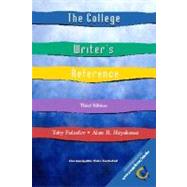
| The Writing Process | |
| A Writer's Questions | |
| The Writing Process | |
| Writing to Discover | |
| Journal Writing | |
| Recounting Experience | |
| Explaining Concepts | |
| Interpreting Texts | |
| Arguing Positions | |
| Revising | |
| Editing | |
| The Research Process | |
| Beginning Research | |
| Conducting Library Research | |
| Conducting Internet Research | |
| Conducting Field Research | |
| Evaluating Research Sources | |
| Using Sources | |
| Document Design | |
| Principles of Design | |
| Constructing Web Pages | |
| Portfolios and Publishing | |
| Editing: Clarity | |
| Paragraph Structure | |
| Strong Openings | |
| Thoughtful Closings | |
| Powerful Sentences | |
| Concise Sentences | |
| Strong Verbs | |
| Specific Nouns, Modifiers | |
| The Right Word | |
| Unbiased Language | |
| Proofreading | |
| Editing: Punctuation | |
| Commas | |
| Semicolons | |
| Colons | |
| Apostrophes | |
| Quotation Marks | |
| Parentheses and Brackets | |
| Dashes, Slashes, & Ellipsis Points | |
| End Punctuation | |
| Editing: Conventions of Written English | |
| Spelling | |
| Capitalization | |
| Hyphens | |
| Numbers | |
| Abbreviations | |
| Italics and Underlining | |
| Editing: Grammar | |
| Reviewing Grammar | |
| Using Verbs Correctly | |
| Making Subjects Agree with Verbs | |
| Using Pronouns Correctly | |
| Working with Adjectives and Adverbs | |
| Positioning Modifiers | |
| Eliminating Sentence Fragments | |
| Eliminating Comma Splices and Fused Sentences | |
| Eliminating Shifts and Mixed Constructions | |
| Academic Conventions | |
| MLA Documentation | |
| APA Documentation | |
| CMS and Other Documentation Styles | |
| Writing for Work | |
| Glossary of Usage | |
| ESL Index | |
| Index | |
| Revision Symbols | |
| Table of Contents provided by Publisher. All Rights Reserved. |
The New copy of this book will include any supplemental materials advertised. Please check the title of the book to determine if it should include any access cards, study guides, lab manuals, CDs, etc.
The Used, Rental and eBook copies of this book are not guaranteed to include any supplemental materials. Typically, only the book itself is included. This is true even if the title states it includes any access cards, study guides, lab manuals, CDs, etc.